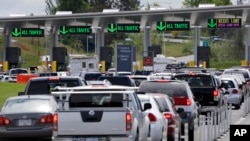Canada plans to tighten its border security by collecting fingerprints and other biometric data from more foreign travelers, Prime Minister Stephen Harper said on Thursday.
He also said his Conservative federal government would commit additional resources to help the country's spy agency and tax collection agency interrupt "jihadist terrorism."
Harper said the expansion would help Canada shut down charities that finance Islamist militancy and track fraudulent immigrants and those traveling to and from battlefields abroad.
"We’ll make sure people are who they say they are," Harper said. "You can fake your name, you can fake your documents, but you cannot fake your fingerprints."
All travelers entering Canada on a visa must undergo biometric screening, a sharp jump from the current requirement for citizens of 29 countries to supply fingerprints and other personal information.
Biometrics refers to technologies that measure and authenticate human body characteristics, such as fingerprints, eye retina scans, and voice patterns.
Travelers will pay a fee to recoup the costs of the additional screening, Harper said.
Canada, like other Western nations, is trying to stem a flow of disaffected, mostly young, Muslims who want to join movements such as Islamic State.
Canadian jets are taking part in U.S.-led bombing missions against the group in Iraq and Syria, while the country last year sent 70 special forces troops to help train Iraqi soldiers.
In April, Canada's spy agency said as many as 75 Canadians had gone to join militant groups in Iraq and Syria in the previous three or four months.
The Conservative federal government has also introduced tough new legislation that would give police and security agencies more power to stop people going abroad to link up with Islamic State and similar movements.
Harper, facing a tough challenge to retain power in October's general election, says rival political parties are weak on terrorism and that only his Conservatives properly understand the threat Islamic State poses to Canada.





